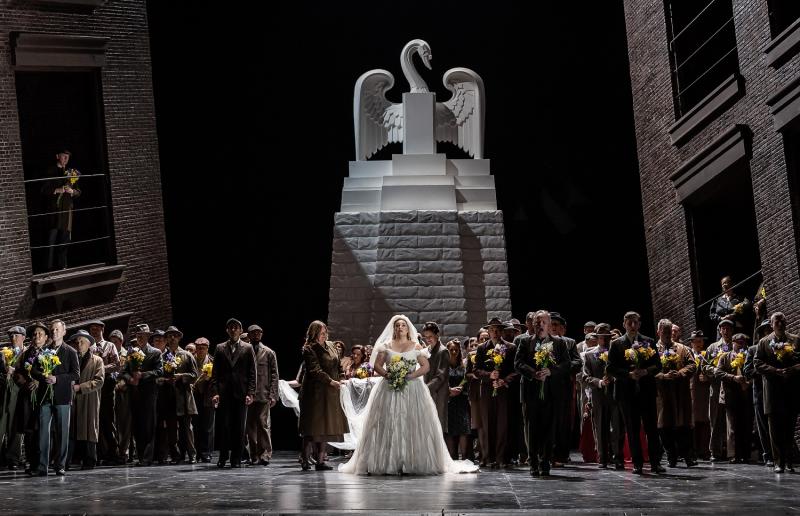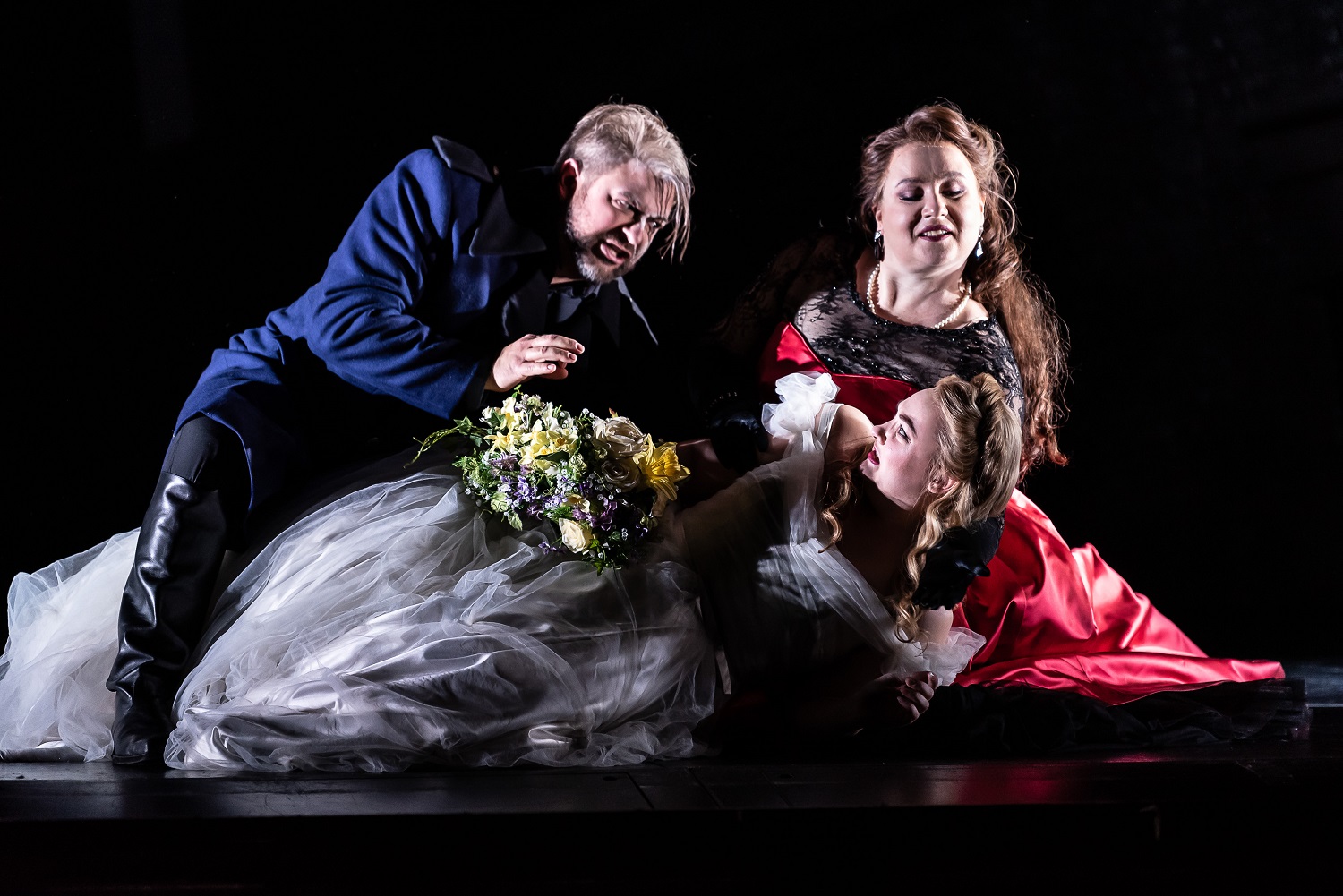Lohengrin, Royal Opera review - a timely return to warzone Brabant | reviews, news & interviews
Lohengrin, Royal Opera review - a timely return to warzone Brabant
Lohengrin, Royal Opera review - a timely return to warzone Brabant
Uneven casting for this first revival, but Jakub Hrůša shines at the podium

David Alden’s Lohengrin is back at Covent Garden for a first revival. The defining image the first time round, in 2018, was of the ending, a political rally for King Henry’s regime, with Lohengrin and the swan as its icons. That felt crude – a two-dimensional morality, and tangential to the story.
That still smarts, but Alden’s ideas (revived without noticeable changes by Peter Relton) are more diverse than they first seemed and repay a second viewing. Musically, the revival is quite strong, with impressive leads but a weaker supporting cast; a fitful ensemble effort where the first run was all about the star names.
 Although the visual language is ambiguous, the setting is an early 20th century war zone. The first act plays out against a backdrop of tilted brick facades with huge, slanted window frames, in which the chorus appears. Sadly, the wartime imagery is more timely this time round, especially the sight of Telramund (Craig Colclough) being brutalised and humiliated after his defeat. No swan as such, but rather a complex light projection, of feathers and wings, designed by Tal Rosner, an elegant effect. The second act opens a dark bunker, where Ortrud (Anna Smirnova) and Telramund quarrel under a bare strip light. The Procession to the Cathedral reveals a huge, stylised effigy of the swan, the first suggestion of totalitarianism. That becomes explicit in the final scene of Act III, where the stage is draped with flags of the swan motif, as Brabant readies for war.
Although the visual language is ambiguous, the setting is an early 20th century war zone. The first act plays out against a backdrop of tilted brick facades with huge, slanted window frames, in which the chorus appears. Sadly, the wartime imagery is more timely this time round, especially the sight of Telramund (Craig Colclough) being brutalised and humiliated after his defeat. No swan as such, but rather a complex light projection, of feathers and wings, designed by Tal Rosner, an elegant effect. The second act opens a dark bunker, where Ortrud (Anna Smirnova) and Telramund quarrel under a bare strip light. The Procession to the Cathedral reveals a huge, stylised effigy of the swan, the first suggestion of totalitarianism. That becomes explicit in the final scene of Act III, where the stage is draped with flags of the swan motif, as Brabant readies for war.
Vocally, the performance gets off to an excellent start with the arrival of Derek Welton as the Herald. He is a seasoned Wagnerian, and remarkably, this is his Royal Opera debut. His dress is imposing, the whole of the right side of his body bound in braces and supports, his walk a stubborn limp. The other low voices are less impressive. Gábor Bretz has good articulation as King Henry, but lacks the heft of voice to carry the role, especially given the heightened villainy that Alden imposes. Craig Colclough is more convincing as Telramund, but he too lacks vocal weight. Anna Smirnova brings a big, Russian sound to the role of Ortrud. This, finally, is singing on a Wagnerian scale, although she sometimes sounds forced at the ends of the long phrases in the second act.
Fortunately, the two leads are both excellent. Brandon Jovanovich has an agile and well-supported voice, up to most of the Heldentenor demands of the title role. In the first act, he swoops up to many of the top notes, but that trait disappears in the second. He struggles with some of the lower passages, especially when singing the question motif – an unusual problem for a Wagner tenor – but his top range is open and clear. He looks the part, too. Soprano Jennifer Davis (pictured above, with Brandon Jovanovich) returns as Elsa. It is her signature role, and it shows. She has a beautifully rich, alto-like tone, but her voice is agile too, and well serves the many dramatic demands. (Pictured below, Craig Colclogh, Anna Smirnova, Jennifer Davis) The ROH Chorus have their work cut out, but deliver the many imposing tuttis with conviction and impressive power. Some ensemble problems in the first act were undoubtedly caused by having the chorus distributed around the complex set. But the choral singing in the second and third acts was impeccable. The second act scene in which the Herald announces Telramund’s banishment was a tour de force for the tenors and basses, and the Procession to the Cathedral is even better.
The ROH Chorus have their work cut out, but deliver the many imposing tuttis with conviction and impressive power. Some ensemble problems in the first act were undoubtedly caused by having the chorus distributed around the complex set. But the choral singing in the second and third acts was impeccable. The second act scene in which the Herald announces Telramund’s banishment was a tour de force for the tenors and basses, and the Procession to the Cathedral is even better.
Best of all was the orchestral playing under the astute leadership of Jakub Hrůša. He is not the sort of conductor who looks for energy and excitement in every phrase, and his tempos are often slow. But he builds well to climaxes and is able to maintain the broad orchestral textures over long spans. He is good with details too, like the careful phrasing he applies to the woodwind solos and ensembles under Elsa’s lines. He communicates well with the singers, punctuating the orchestral textures in close alignment with the vocal phrases. He sometimes draws out individual lines, but always seems to know how far he can stretch the singers. And the climaxes, to the Prelude and to each of the acts, are just stunning. The Royal Opera is on the lookout for a new Music Director: could this engagement by a try-out for Hrůša? If so, he is a strong contender.
rating
Explore topics
Share this article
Add comment
The future of Arts Journalism
You can stop theartsdesk.com closing!
We urgently need financing to survive. Our fundraising drive has thus far raised £49,000 but we need to reach £100,000 or we will be forced to close. Please contribute here: https://gofund.me/c3f6033d
And if you can forward this information to anyone who might assist, we’d be grateful.

Subscribe to theartsdesk.com
Thank you for continuing to read our work on theartsdesk.com. For unlimited access to every article in its entirety, including our archive of more than 15,000 pieces, we're asking for £5 per month or £40 per year. We feel it's a very good deal, and hope you do too.
To take a subscription now simply click here.
And if you're looking for that extra gift for a friend or family member, why not treat them to a theartsdesk.com gift subscription?
more Opera
 La bohème, Opera North review - still young at 32
Love and separation, ecstasy and heartbreak, in masterfully updated Puccini
La bohème, Opera North review - still young at 32
Love and separation, ecstasy and heartbreak, in masterfully updated Puccini
 Albert Herring, English National Opera review - a great comedy with depths fully realised
Britten’s delight was never made for the Coliseum, but it works on its first outing there
Albert Herring, English National Opera review - a great comedy with depths fully realised
Britten’s delight was never made for the Coliseum, but it works on its first outing there
 Carmen, English National Opera review - not quite dangerous
Hopes for Niamh O’Sullivan only partly fulfilled, though much good singing throughout
Carmen, English National Opera review - not quite dangerous
Hopes for Niamh O’Sullivan only partly fulfilled, though much good singing throughout
 Giustino, Linbury Theatre review - a stylish account of a slight opera
Gods, mortals and monsters do battle in Handel's charming drama
Giustino, Linbury Theatre review - a stylish account of a slight opera
Gods, mortals and monsters do battle in Handel's charming drama
 Susanna, Opera North review - hybrid staging of a Handel oratorio
Dance and signing complement outstanding singing in a story of virtue rewarded
Susanna, Opera North review - hybrid staging of a Handel oratorio
Dance and signing complement outstanding singing in a story of virtue rewarded
 Ariodante, Opéra Garnier, Paris review - a blast of Baroque beauty
A near-perfect night at the opera
Ariodante, Opéra Garnier, Paris review - a blast of Baroque beauty
A near-perfect night at the opera
 Cinderella/La Cenerentola, English National Opera review - the truth behind the tinsel
Appealing performances cut through hyperactive stagecraft
Cinderella/La Cenerentola, English National Opera review - the truth behind the tinsel
Appealing performances cut through hyperactive stagecraft
 Tosca, Royal Opera review - Ailyn Pérez steps in as the most vivid of divas
Jakub Hrůša’s multicoloured Puccini last night found a soprano to match
Tosca, Royal Opera review - Ailyn Pérez steps in as the most vivid of divas
Jakub Hrůša’s multicoloured Puccini last night found a soprano to match
 Tosca, Welsh National Opera review - a great company reduced to brilliance
The old warhorse made special by the basics
Tosca, Welsh National Opera review - a great company reduced to brilliance
The old warhorse made special by the basics
 BBC Proms: The Marriage of Figaro, Glyndebourne Festival review - merriment and menace
Strong Proms transfer for a robust and affecting show
BBC Proms: The Marriage of Figaro, Glyndebourne Festival review - merriment and menace
Strong Proms transfer for a robust and affecting show
 BBC Proms: Suor Angelica, LSO, Pappano review - earthly passion, heavenly grief
A Sister to remember blesses Puccini's convent tragedy
BBC Proms: Suor Angelica, LSO, Pappano review - earthly passion, heavenly grief
A Sister to remember blesses Puccini's convent tragedy
 Orpheus and Eurydice, Opera Queensland/SCO, Edinburgh International Festival 2025 review - dazzling, but distracting
Eye-popping acrobatics don’t always assist in Gluck’s quest for operatic truth
Orpheus and Eurydice, Opera Queensland/SCO, Edinburgh International Festival 2025 review - dazzling, but distracting
Eye-popping acrobatics don’t always assist in Gluck’s quest for operatic truth

Comments
I wonder where critic Gavin
I agree. I was in the side